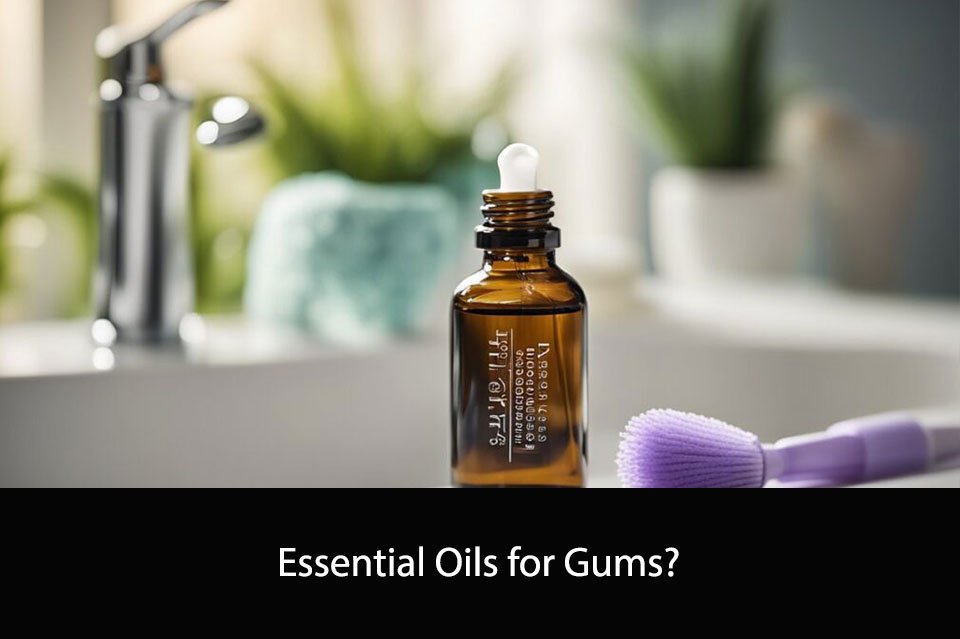Essential oils have been used for centuries for various health benefits, including oral health. While many people are aware of the benefits of essential oils for fresh breath and healthy teeth, few know that these oils can also be used to promote healthy gums.
Gum disease is a common oral health issue that affects millions of people worldwide. It is caused by the buildup of plaque and bacteria on the teeth and gums, which can lead to inflammation, bleeding, and even tooth loss. Essential oils can be used as a natural remedy for gum disease, as they have antibacterial and anti-inflammatory properties that can help reduce inflammation and promote healing.
Some of the most effective essential oils for gums include tea tree oil, peppermint oil, and clove oil. These oils can be used in a variety of ways, including as a mouthwash, toothpaste, or even as a topical treatment applied directly to the gums. By incorporating essential oils into your oral health routine, you can promote healthy gums and prevent gum disease naturally.
Understanding Essential Oils

Essential oils are highly concentrated plant extracts that are obtained through steam distillation or cold pressing. These oils are known for their therapeutic properties and have been used for centuries in traditional medicine.
When it comes to gum health, essential oils can be a great natural remedy. Some essential oils have anti-inflammatory, antimicrobial, and analgesic properties that can help reduce gum inflammation, fight bacteria, and relieve pain.
Here are some essential oils that are commonly used for gum health:
- Tea Tree Oil: Known for its antimicrobial properties, tea tree oil can help fight bacteria and reduce inflammation in the gums.
- Clove Oil: Clove oil has analgesic properties that can help relieve toothache and gum pain. It also has antimicrobial properties that can help fight bacteria.
- Peppermint Oil: Peppermint oil has a refreshing scent and can help reduce inflammation and pain in the gums.
- Eucalyptus Oil: Eucalyptus oil has anti-inflammatory and antimicrobial properties that can help reduce gum inflammation and fight bacteria.
It’s important to note that essential oils should never be ingested and should always be diluted before use. You can dilute essential oils with a carrier oil such as coconut oil or olive oil.
In conclusion, essential oils can be a great natural remedy for gum health. However, it’s important to use them safely and responsibly. Always consult with a healthcare professional before using essential oils and follow proper dilution guidelines.
Essential Oils for Gums

Taking care of our gums is essential for maintaining good oral health. In addition to regular brushing and flossing, using essential oils can help promote healthy gums. Here are some essential oils that can benefit your gums:
Peppermint Oil
Peppermint oil has antibacterial properties that can help fight against harmful bacteria in the mouth. It also has a cooling effect that can help soothe inflamed gums. Peppermint oil can be added to your toothpaste or mouthwash to promote healthy gums.
Tea Tree Oil
Tea tree oil is known for its antiseptic and anti-inflammatory properties. It can help reduce gum inflammation and prevent the growth of harmful bacteria in the mouth. Tea tree oil can be added to your toothpaste or mouthwash to promote healthy gums.
Clove Oil
Clove oil has been used for centuries for its analgesic and antibacterial properties. It can help reduce gum inflammation and relieve pain associated with gum disease. Clove oil can be added to your toothpaste or applied directly to the gums for relief.
Lavender Oil
Lavender oil has anti-inflammatory and analgesic properties that can help reduce gum inflammation and pain. It can also help promote relaxation and reduce stress, which can contribute to gum disease. Lavender oil can be added to your toothpaste or applied directly to the gums for relief.
Eucalyptus Oil
Eucalyptus oil has antibacterial properties that can help fight against harmful bacteria in the mouth. It also has anti-inflammatory properties that can help reduce gum inflammation. Eucalyptus oil can be added to your toothpaste or mouthwash to promote healthy gums.
Using essential oils can be a great addition to your oral hygiene routine. However, it’s important to use them safely and appropriately. Always dilute essential oils before using them, and avoid ingesting them. If you experience any adverse reactions, discontinue use and consult a healthcare professional.
Benefits of Essential Oils for Gums

Essential oils have been used for centuries to promote oral health. When it comes to gum health, essential oils can be particularly beneficial. Here are some of the benefits of using essential oils for gums:
1. Reduces inflammation
Inflammation is a common cause of gum disease. Essential oils like clove, peppermint, and tea tree oil have anti-inflammatory properties that can help reduce inflammation in the gums. By reducing inflammation, essential oils can help prevent gum disease and promote gum health.
2. Fights bacteria
Bacteria in the mouth can cause gum disease, bad breath, and other oral health problems. Essential oils like cinnamon, eucalyptus, and thyme have antibacterial properties that can help fight bacteria in the mouth. By reducing the amount of bacteria in the mouth, essential oils can help prevent gum disease and promote gum health.
3. Freshens breath
Bad breath is a common problem that can be caused by poor oral hygiene, gum disease, and other factors. Essential oils like peppermint, spearmint, and lemon have a fresh, minty scent that can help freshen breath. By freshening breath, essential oils can help improve overall oral health.
Overall, essential oils can be a great addition to your oral hygiene routine. By reducing inflammation, fighting bacteria, and freshening breath, essential oils can help promote gum health and prevent gum disease.
How to Use Essential Oils for Gums
When it comes to maintaining healthy gums, essential oils can be a great addition to your oral care routine. Here are two ways to use essential oils for your gums:
Topical Application
One way to use essential oils for gums is through topical application. Simply add a drop of essential oil to your toothpaste or mouthwash, or dilute it with a carrier oil and apply it directly to your gums.
Some essential oils that are particularly beneficial for gum health include tea tree oil, peppermint oil, and clove oil. Tea tree oil has antimicrobial properties that can help fight against harmful bacteria in the mouth, while peppermint oil can help soothe inflammation and freshen breath. Clove oil has been used for centuries to relieve toothache pain and has also been shown to have antimicrobial and anti-inflammatory properties.
Oil Pulling
Another way to use essential oils for gums is through oil pulling. This ancient Ayurvedic practice involves swishing a tablespoon of oil (such as coconut, sesame, or olive oil) in your mouth for 15-20 minutes before spitting it out.
To enhance the benefits of oil pulling, you can add a drop of essential oil to the oil before swishing. Some essential oils that are commonly used for oil pulling include peppermint oil, tea tree oil, and cinnamon oil. These oils not only help freshen breath but also have antibacterial and anti-inflammatory properties that can help improve gum health.
Incorporating essential oils into your oral care routine can be a natural and effective way to support gum health. However, it’s important to use essential oils safely and appropriately. Always dilute essential oils with a carrier oil before applying them to your gums, and consult with a healthcare professional if you have any concerns or questions.
Safety Measures and Precautions
When using essential oils for gum health, it is important to take certain safety measures and precautions to ensure that you are using them safely and effectively. Here are some tips to keep in mind:
- Always dilute essential oils before use. Essential oils are highly concentrated and can cause skin irritation or sensitivity when used undiluted. We recommend diluting essential oils with a carrier oil such as coconut oil or almond oil before applying them to your gums.
- Test for sensitivity before use. Before applying essential oils to your gums, it is important to test for sensitivity. We recommend applying a small amount of diluted essential oil to the inside of your wrist and waiting for 24 hours to see if you experience any adverse reactions.
- Do not ingest essential oils. While some essential oils are safe for internal use, we do not recommend ingesting essential oils for gum health. Ingesting essential oils can be toxic and cause serious health problems.
- Keep essential oils out of reach of children and pets. Essential oils should be stored in a cool, dry place and kept out of reach of children and pets. Ingesting essential oils can be dangerous, especially for young children and pets.
- Consult with a healthcare professional. If you have any underlying health conditions or are taking medication, we recommend consulting with a healthcare professional before using essential oils for gum health. Essential oils can interact with certain medications and may not be safe for everyone to use.
By following these safety measures and precautions, you can safely and effectively use essential oils for gum health. Remember to always use caution when using essential oils and discontinue use if you experience any adverse reactions.
Conclusion

In conclusion, essential oils can be a useful addition to your oral care routine to help maintain healthy gums. While they should not be used as a substitute for regular brushing and flossing, they can provide additional support to promote gum health.
When using essential oils for gums, it is important to dilute them properly and use them in moderation. Some essential oils may cause irritation or allergic reactions, so it is best to test a small amount on your skin before using them in your mouth.
Overall, essential oils can be a natural and effective way to promote gum health. By incorporating them into your daily routine, you can help prevent gum disease and maintain a healthy smile.
Frequently Asked Questions
What are the benefits of using essential oils for oral health?
Using essential oils for oral health can provide several benefits. They can help fight bad breath, reduce inflammation, and promote healthy gums. Essential oils can also help prevent tooth decay and promote overall oral hygiene.
What are some safe essential oils to use for gum health?
Some safe essential oils to use for gum health include tea tree oil, peppermint oil, cinnamon oil, and clove oil. These oils have anti-inflammatory and antibacterial properties that can help promote healthy gums.
How can eucalyptus oil benefit gum health?
Eucalyptus oil has anti-inflammatory and antimicrobial properties that can help reduce inflammation and fight bacteria in the mouth. It can also help freshen breath and promote overall oral health.
Can clove oil help with gum disease?
Yes, clove oil can help with gum disease. It has antibacterial properties that can help fight the bacteria that cause gum disease. It can also help reduce inflammation and promote healthy gums.
Is tea tree oil safe to use directly on gums?
Tea tree oil can be safe to use directly on gums, but it should be used with caution. It is a strong oil and can cause irritation if used in high concentrations. It is best to dilute it with a carrier oil before using it on gums.
How can essential oils be used for oil pulling?
Essential oils can be used for oil pulling by adding a few drops to a tablespoon of coconut oil and swishing it around in the mouth for 10-20 minutes. This can help remove bacteria and promote healthy gums and teeth.





